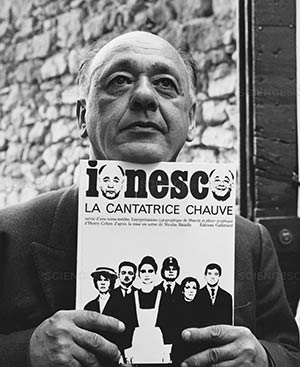Dramaturgy
About the Playwright
 Eugene Ionesco was a playwright who many might call absurd in his own right. Born in Romania in 1909, he immigrated to France as an infant. Upon returning to Romania, he began to notice his colleagues sympathize with the Nazi Party. Heavily alarmed by this, he moved back to France with his family and waited out World War Two in the countryside, watching with alarm as fascism rose from around him. He moved to Paris after the war, and began writing what he called “anti-plays” at the age of forty. The world quickly took notice of his works, which included themes of death, the fallacies of communication, fascism and ideologies—all which seemed to follow the “dream logic” of Ionesco’s subconscious mind and reflect the phenomena of life itself.
Eugene Ionesco was a playwright who many might call absurd in his own right. Born in Romania in 1909, he immigrated to France as an infant. Upon returning to Romania, he began to notice his colleagues sympathize with the Nazi Party. Heavily alarmed by this, he moved back to France with his family and waited out World War Two in the countryside, watching with alarm as fascism rose from around him. He moved to Paris after the war, and began writing what he called “anti-plays” at the age of forty. The world quickly took notice of his works, which included themes of death, the fallacies of communication, fascism and ideologies—all which seemed to follow the “dream logic” of Ionesco’s subconscious mind and reflect the phenomena of life itself.
Ionesco died at the age of 84, in 1994, in his Paris apartment where he had lived during the course of his playwriting career. He is lauded as one of the founders of the Theater of the Absurd. Ionesco himself did not call his own plays absurd, however—he stated that “It is our very existence that I find unimaginable, unthinkable.”
–Alice Irvin, dramaturg
Photo credit: Rapho Agence / Science Source
On Theatre of the Absurd
The Theatre of the Absurd is a historical label given by critic and theatre historian Martin Esslin to a group of playwrights and plays from the 1940s and 50s that rejected the logic and conventions of their time, highlighting through both content and form the inadequacy of language and rationalism responding in part to the devastating developments of World War Two. Absurdism finds its philosophical roots in existentialism, another externally imposed historical label assigned to a general school of thought beginning in the 1930s and 40s represented by such thinkers as Sartre and Camus. The Stanford Encyclopedia of Philosophy describes existentialism as a flight from the "iron cage of reason", marked by exploration with new modes and categories of thought in order to comprehend the unique challenges of human existence and the conditions of absurdity. The term "absurd" is derived originally from music, where it roughly refers to the effect of two stimuli being juxtaposed just out of sync from one another. Applied to philosophical thought, it has been applied to the out-of-sync relationship between human reason/hopes/knowledge and "the irrational universe into which they are born" (Brockett pg. 455). Ionesco described the absurd as "that which is devoid of purpose", while Camus referred to the absurd as "[t]he divorce between a man and his life, the actor and his setting", resulting from inhabiting "a universe that is suddenly deprived of illusions".
According to Esslin, Absurdist playwrights were notable for their exploration of absurdity and other existentialist themes through both the content and the form of their works. The innovative use of repetition, nonconventional dramatic structure, unfamiliar scenarios and serious gaps in communication, language use, or the use of logic are notable in many Absurdist plays. In this manner, Esslin distinguishes between playwrights such as Ionesco, Jean Genet, and Samuel Beckett and e.g. the philosophers-turned-playwright Sartre and Camus, who wrote plays exploring existentialist themes which nevertheless relied heavily on pre-existing conventions regarding dramatic structure and storytelling. It is important to emphasize that the Absurdist playwrights did not consider themselves as such while they were creating their works; the label was externally imposed by the critical literature. Ionesco, for instance, would look back on his work and prefer to place it under the category of avant-garde theater. Nevertheless, the set of existential ideas explored in many of Ionesco's plays demonstrates a certain unity with, for example, the circular structures and limited mobility witnessed in many of Beckett's plays or the unsettling representations of shifting identities and self-expressions in the works of Genet.
Please note that this description represents a French-centered description of a European formulation of a theatrical tradition that likely has been influenced by, has had influence on, and has had antecedents in, other cultures or parts of the world. For more information about the Theatre of the Absurd and other Absurdist playwrights, please refer to our bibliography.
–T. S. Wolff, assistant director
Bibliography
Bolick, Elizabeth L. “ Absurdism in Post-Modern Art: Examining the Interplay between ‘Waiting for Godot’ and ‘Extremely Loud and Incredibly Close.’” Inquiries Journal, 2009.
Brockett, Oscar G., and Franklin J. Hildy. History of the Theatre. Pearson.
Castleman, Riva. “Art of the Forties: MoMA.” The Museum of Modern Art.
Crowell, Steven. “Existentialism.” Stanford Encyclopedia of Philosophy, Stanford University, 9 Mar. 2015.
Esslin, Martin Julius. The Theatre of the Absurd. Penguin, 1968.
Mills, Ian C., and Wharton Group. “Eugene Ionesco- French Dramatist.” Biography of Eugene Ionesco - French Dramatist.
Olafson, Frederick A., and Albert Camus. “The Myth of Sisyphus.” The Philosophical Review, vol. 66, no. 1, 1957.
Ovide. “E.g. [Illustrations De Les Métamorphoses] / [Non Identifié] ; Ovide, Aut. Du Texte.” Gallica, 1 Jan. 1970.
Strong, Benjamin. “Samuel Beckett: A Short Biography.” The Samuel Beckett Society, 29 Oct. 2016.